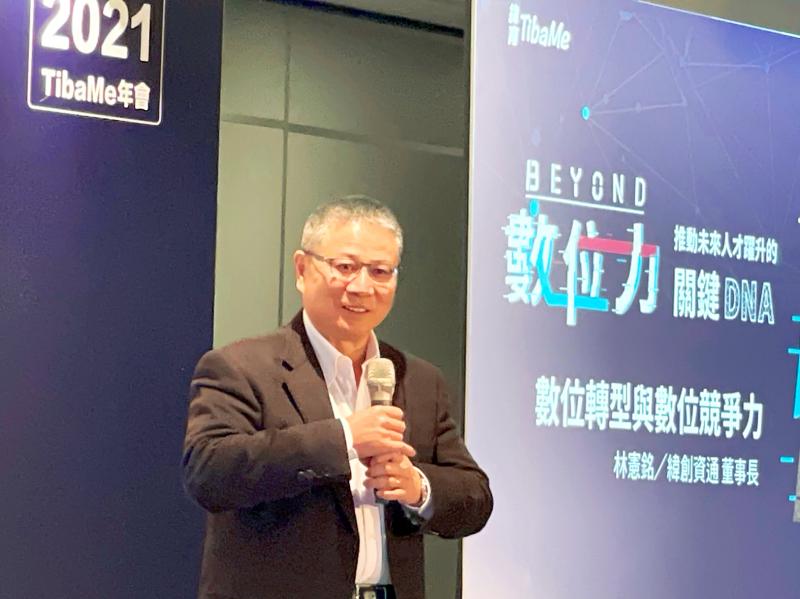Wistron Corp (緯創), one of Apple Inc’s iPhone assemblers, yesterday reported that first-quarter net profit plunged 95 percent quarter-on-quarter and 84 percent year-on-year to NT$113 million (US$4.05 million), dragged by non-operating losses.
That compared with a net profit of NT$726.71 million a year earlier and NT$2.32 billion in the fourth quarter of last year.
Earnings per share (EPS) dipped to NT$0.04, from NT$0.26 a year earlier and NT$0.83 the previous quarter.

Photo: CNA
Wistron attributed the losses to its holdings of Luxshare Precision Industry Co (立訊精密), whose share price has plunged about 40 percent since it bought 3 billion yuan (US$466 million) of the cable and connector supplier’s common shares in July last year.
Last year, Wistron sold two of its subsidiaries — Wistron InfoComm Manufacturing (Kunshan) Co (緯新資通崑山) and Wistron Investment (Jiangsu) Co (緯創投資江蘇) — to Luxshare for 3.3 billion yuan. The stock purchase, which came after the sales, gave Wistron an 0.81 percent stake in Luxshare, which it described as a “strategic partner.”
Wistron’s operating income surged 62 percent year-on-year to NT$3.08 billion last quarter, but declined 28 percent from a quarter earlier.
Consolidated revenue slid 2 percent year-on-year to NT$177.3 billion last quarter.
The company also reported consolidated revenue for last month of NT$68.22 billion, down 2.01 percent from a year earlier.
QUANTA
Quanta Computer Inc (廣達電腦), the world’s largest laptop contract maker, reported consolidated revenue of NT$84.84 billion last month, down 10.2 percent month-on-month, but up 1.7 percent year-on-year.
Cumulative revenue in the first four months of this year was NT$353.79 billion, up 29.3 percent year-on-year.
The company shipped 6.1 million laptops last month, down 7.58 percent month-on-month, but up 32.6 percent year-on-year.
COMPAL
Fellow laptop contract manufacturer Compal Electronics Inc (仁寶) experienced a sharper month-on-month drop in revenue, which fell 17.38 percent month-on-month and 5.25 percent year-on-year to NT$89.35 billion.
Compal shipped 4.4 million laptops last month, down 20 percent from a month earlier, but up 2.33 percent year-on-year.
The company said that demand remained strong, but tight components supply, including CPUs, monitors and power supplies, affected shipments.
Compal expects to ship more than 47 million laptops this year, at least 10 percent more than it did last year.
Contract electronics manufacturer Inventec Corp (英業達) yesterday posted sales of NT$38.19 billion for last month, down 6.8 percent month-on-month and 22.5 percent year-on-year.
Cumulative sales in the first four months of the year rose 8.75 percent year-on-year to NT$150.04 billion.

COMPETITION: AMD, Intel and Qualcomm are unveiling new laptop and desktop parts in Las Vegas, arguing their technologies provide the best performance for AI workloads Advanced Micro Devices Inc (AMD), the second-biggest maker of computer processors, said its chips are to be used by Dell Technologies Inc for the first time in PCs sold to businesses. The chipmaker unveiled new processors it says would make AMD-based PCs the best at running artificial intelligence (AI) software. Dell has decided to use the chips in some of its computers aimed at business customers, AMD executives said at CES in Las Vegas on Monday. Dell’s embrace of AMD for corporate PCs — it already uses the chipmaker for consumer devices — is another blow for Intel Corp as the company

ADVANCED: Previously, Taiwanese chip companies were restricted from building overseas fabs with technology less than two generations behind domestic factories Taiwan Semiconductor Manufacturing Co (TSMC, 台積電), a major chip supplier to Nvidia Corp, would no longer be restricted from investing in next-generation 2-nanometer chip production in the US, the Ministry of Economic Affairs said yesterday. However, the ministry added that the world’s biggest contract chipmaker would not be making any reckless decisions, given the weight of its up to US$30 billion investment. To safeguard Taiwan’s chip technology advantages, the government has barred local chipmakers from making chips using more advanced technologies at their overseas factories, in China particularly. Chipmakers were previously only allowed to produce chips using less advanced technologies, specifically

MediaTek Inc (聯發科) yesterday said it is teaming up with Nvidia Corp to develop a new chip for artificial intelligence (AI) supercomputers that uses architecture licensed from Arm Holdings PLC. The new product is targeting AI researchers, data scientists and students rather than the mass PC market, the company said. The announcement comes as MediaTek makes efforts to add AI capabilities to its Dimensity chips for smartphones and tablets, Genio family for the Internet of Things devices, Pentonic series of smart TVs, Kompanio line of Arm-based Chromebooks, along with the Dimensity auto platform for vehicles. MeidaTek, the world’s largest chip designer for smartphones

TECH PULL: Electronics heavyweights also attracted strong buying ahead of the CES, analysts said. Meanwhile, Asian markets were mixed amid Trump’s incoming presidency Taiwan Semiconductor Manufacturing Co (TSMC, 台積電) shares yesterday closed at a new high in the wake of a rally among tech stocks on Wall Street on Friday, moving the TAIEX sharply higher by more than 600 points. TSMC, the most heavily weighted stock in the TAIEX, rose 4.65 percent to close at a new high of NT$1,125, boosting its market value to NT$29.17 trillion (US$888 billion) and contributing about 400 points to the TAIEX’s rise. The TAIEX ended up 639.41 points, or 2.79 percent, at 23,547.71. Turnover totaled NT$406.478 billion, Taiwan Stock Exchange data showed. The surge in TSMC follows a positive performance